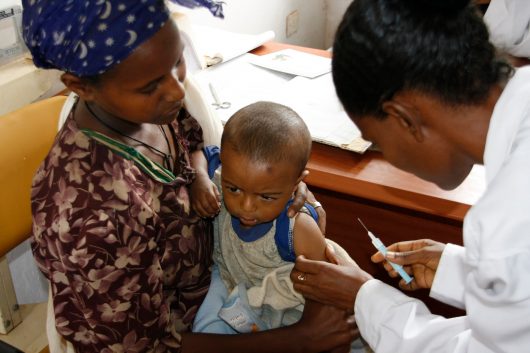
Omboki Monayo
Nairobi, Kenya: In the face of recurring infectious outbreaks, diphtheria has made a disturbing return in four nations within the African Union: Algeria, Guinea, Niger, and Nigeria. By October 9, 2023, a worrying tally of 14,587 infections, boasting a fatality rate of 4.1%, was reported from these nations. The lion’s share, over 90%, emerged from Nigeria.
Diphtheria and pertussis spread from person to person. The toxin’s spread throughout the body can have severe implications for the heart and other critical systems. Without treatment, diphtheria has a mortality rate between 5% and 10%. Notably, in children under 5 and adults over 40, this rate can soar up to 20%. and can lead to difficulty breathing, heart failure, paralysis, or death.
Specifically, by October 5, Nigeria’s case statistics stood at 13,145 diphtheria cases and 493 deaths. Kano State, which is currently grappling with inadequate pentavalent vaccine coverage, is the hardest hit among its eight affected states. Meanwhile, the Republic of Niger registered the outbreak on August 17, 2023, logging 865 cases and 37 fatalities, with the Matameye district – sharing its border with Nigeria – seeing the most afflictions. Guinea reported 497 cases and 58 fatalities, primarily in the Kankan region. Algeria’s southern city of Tamanrasset noted 80 infections, affecting mostly unvaccinated foreign nationals.
Even though Africa has made significant strides, pronounced disparities in DPT coverage remain at both national and regional levels across the continent. The DPT3 and DTaP vaccines can prevent diphtheria, tetanus, and pertussis, and are offered as part of the childhood vaccination package in most countries across the continent. Low coverage in the affected countries however continues to pose a threat to the life and well-being of infants aged five years and below.
Over 65% of the diphtheria cases across the continent involved individuals with no prior vaccination. Children under 15 comprise over 60% of cases, and females are disproportionately affected, accounting for 62%. Low herd immunity due to lackluster vaccination rates is a key contributor to the disease’s spread.
All affected nations are actively initiating crisis management activities, including mass vaccinations, risk communications, and enhanced surveillance. Yet, challenges persist, primarily due to shortages in laboratory supplies, vaccines, and Diphtheria Antitoxin (DAT).
African CDC, alongside partners like Médecins Sans Frontières (MSF), is stepping up its response, facilitating capacity-building measures and inter-state collaborations. The two non-profit organizations are also gearing up to train over 50 healthcare professionals in Nigeria to help tackle the situation more effectively.

The current diphtheria crisis has highlighted the declining global childhood vaccination rates as a contributing factor to the resurgence of vaccine-preventable diseases.
According to the United Nations Children’s Fund (UNICEF), global vaccination coverage has seen some recovery in 2022. However, there are still 20.5 million children missing out on lifesaving vaccines globally, 2.1 million more than in 2019
During the COVID-19 pandemic, the global coverage of the third dose of the diphtheria-tetanus-pertussis (DTP3) vaccine, a key metric for evaluating a country’s ability to provide routine immunization to children, witnessed a dip. While 86% of children worldwide received this vaccine in 2019, the figure slid to 81% by 2021, reaching its lowest since 2008. Nevertheless, 2022 brought a glimmer of hope. According to the 2022 WHO/UNICEF Estimates of National Immunization Coverage (WUENIC), DTP3 coverage rebounded slightly to 84%.
The current diphtheria outbreak, which is entirely preventable with vaccines, highlights a pressing need for renewed focus on vaccination, improved access, and gender equity. The Africa CDC is advocating for an increased supply of vaccines and critical medical resources, although global shortages, especially of diphtheria antitoxin, remain a hurdle. The organization is pushing for enhanced disease surveillance and a unified approach to tackle vaccine-preventable diseases.
In light of the unfolding diphtheria crisis, there’s a need for immediate, concerted actions aimed at vaccination, medical supply provision, and cooperative endeavors by health systems across the affected and adjacent regions to control and eventually eliminate the outbreak.
omboki2725@gmail.com













